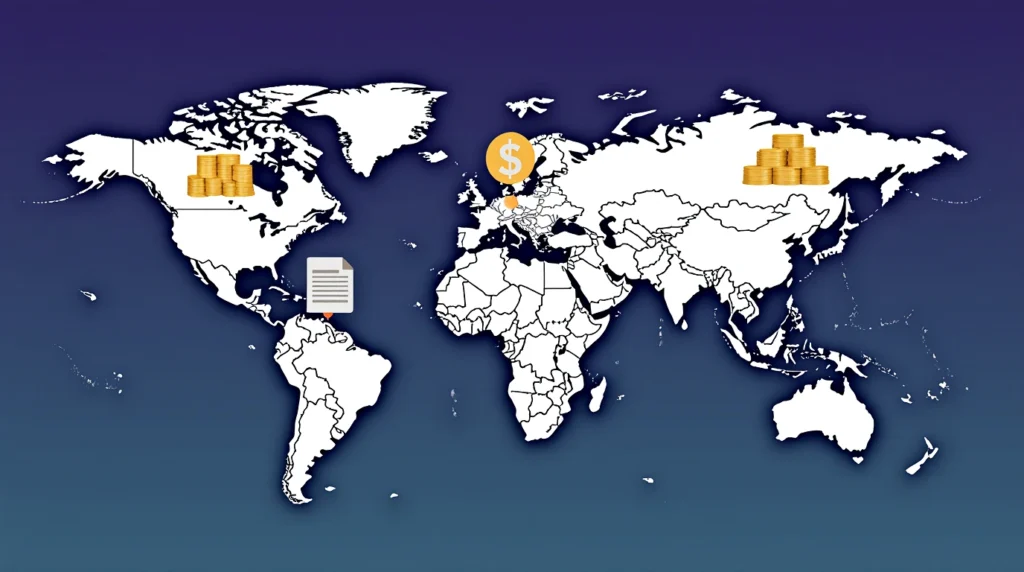Meet Alexandra. A tech entrepreneur from Germany, her company just went public, and her wealth is no longer a local affair. She has investments in London, a portfolio in Singapore, and a venture fund in the US. A decade ago, this diversification might have offered privacy. Today, it creates a digital trail.
This is the new reality of global financial transparency, driven by a powerful system called the Common Reporting Standard (CRS). With over 120 jurisdictions automatically exchanging financial data, the idea of a “secret” offshore account is a relic of the past. But this doesn’t mean privacy is dead. It means the strategy has changed. The most sophisticated approach today isn’t about hiding; it’s about positioning. By strategically and legally relocating her tax residency, Alexandra can navigate this transparent world—fully compliant, yet maintaining her confidentiality.
The Data Superhighway: How CRS Re-routed Privacy
Think of CRS as a global network of plumbing. Every bank is a “sensor” in this system. Their job is to identify any account held by someone who is a tax resident of another country. This term is critical: CRS doesn’t care about your citizenship or your passport. It only cares about where you are legally obligated to pay taxes.
Once the bank’s sensor identifies Alexandra as a German tax resident, it reports her account details—balances, interest, dividends—to its local tax authority (e.g., in Singapore). That authority then automatically “pumps” that data through the CRS pipe directly to the German tax authority. The result? The German government gets a complete picture of Alexandra’s global holdings.
The Legal ‘Off-Ramp’ Built into the System
This system has a fascinating and crucial design feature. The information always flows to the country of tax residency. So, what happens if Alexandra legally moves her tax residency from Germany to a jurisdiction that doesn’t have a personal income tax?
Let’s say she establishes genuine tax residency in the United Arab Emirates (UAE). The bank in Singapore still detects her. It still reports. But now, it reports her information to the UAE’s tax authority. The UAE, having no personal income tax, has no mechanism or legal basis to tax that income. The data flow continues, as required by CRS. It’s fully transparent. But it flows into a “reservoir” where it isn’t used for tax enforcement. Privacy is achieved not through secrecy, but through strategy.
The New “Privacy Havens”: Strategic Destinations
Several jurisdictions have become key destinations for this strategy, each offering a different model.
The United Arab Emirates: The Global Hub
The UAE represents one of the most accessible zero-income-tax jurisdictions. It imposes zero personal income tax on residents—no tax on salaries, dividends, interest, capital gains, or investment returns. UAE law also does not require residents to report their foreign financial accounts. For CRS purposes, this is critical: information flows to the UAE, but no tax enforcement mechanism exists to act upon it. Establishing UAE tax residency requires either meeting a 183-day physical presence requirement or maintaining a primary residence while spending a minimum of 90 days annually, offering flexibility for globally mobile individuals.
Monaco: European Exclusivity
Monaco has maintained zero personal income tax since 1869, offering an institutional commitment to tax-free living. It provides a similar CRS advantage to the UAE but pursues a different residency model. Access emphasizes wealth demonstration and permanent establishment rather than investment-based visas. Residency typically requires establishing a genuine presence through property (owning or renting) and demonstrating financial self-sufficiency, often with a minimum bank deposit of €500,000 to €1 million. This creates a high barrier to entry but provides unmatched European access and lifestyle.
Panama: The Territorial Advantage
Panama offers a structurally different advantage through its territorial tax system. Unlike the UAE and Monaco, Panama taxes only income earned within Panama. All foreign-sourced income—like dividends, capital gains, and interest from international portfolios—is completely untaxed for Panama residents. When CRS information flows to Panamanian authorities, it concerns income that Panama’s tax law explicitly excludes from taxation. Residency is also more accessible, with options like the Pensioner Visa (requiring only $1,000 monthly pension) and various investor visas.
Singapore: Asia’s Financial Powerhouse
Singapore combines a territorial tax system with its status as Asia’s premier financial center. It taxes only locally-earned income and, crucially, imposes zero capital gains tax. For investment-focused individuals, this is a massive advantage. Access via Singapore’s Global Investor Programme (GIP) is set at a high bar, requiring significant investment (e.g., SGD 2.5 million, approx. USD 1.85 million), but it offers unmatched banking infrastructure and seamless integration with Asian business ecosystems.
More Than a Postbox: Establishing Genuine Residency
This is the single most important part of the strategy: it must be real. Tax authorities are not naive. Simply acquiring a “golden visa” or renting a small apartment you never visit is not enough. This is where many high-risk “paper” strategies fail, straying into the territory of tax evasion.
To be recognized as a genuine tax resident under OECD guidelines (which global tax authorities follow), you must prove a clear shift in your “center of vital interests.” This means:
- Residential Establishment: You have a permanent home (owned or long-term lease) available to you.
- Physical Presence: You spend significant time in the country (often 183+ days, or a substantial 90+ days combined with other factors).
- Center of Vital Interests: Your personal and economic ties are strongest there. This includes family relocation (spouse, children in school), business operations, and social connections.
- Administrative Continuity: Your utility bills, local bank accounts, and professional registrations are all centered in your new jurisdiction.
Closing the Door: The Art of Tax Residency Termination
Successfully relocating is a two-part process. It’s not just about arriving in Dubai or Monaco; it’s about properly leaving your old jurisdiction. If Alexandra moves to the UAE but fails to sever her tax ties with Germany, she could find herself in a “dual residency” nightmare, potentially owing taxes in both countries.
Termination requires formal steps:
- Filing a final tax return in your previous jurisdiction.
- Notifying tax authorities of your change in residency.
- Understanding “exit taxes.” Many high-tax countries (like the US, UK, and Canada) will essentially tax your unrealized gains on assets when you leave—a final bill for the wealth you’ve built while a resident. This process is complex and is precisely where professional tax advice is non-negotiable.
The Next Frontier: CRS 2.0 and Cryptocurrency
The system continues to evolve. Beginning in 2026, CRS expands dramatically through CRS 2.0 and the new Crypto-Asset Reporting Framework (CARF). These new rules will extend automatic reporting requirements beyond traditional bank accounts to include cryptocurrency assets, e-money, and central bank digital currencies.
However, these expansions do not change the fundamental mechanic. The information will still flow to the account holder’s country of tax residence. For an individual who is a legitimate tax resident in a zero-income-tax jurisdiction, this expansion creates more information flow, but it still does not create a tax enforcement implication.
Layering the Strategy: Trusts, Foundations, and Real Assets
For those seeking additional layers of confidentiality, tax residency is the foundation, not the entire fortress. This strategy can be combined with other long-standing legal structures.
Trusts and Foundations
Establishing a discretionary trust or a private foundation in a jurisdiction with strong confidentiality laws (like the Cayman Islands or Dubai’s DIFC) can add another layer. For CRS purposes, the trust itself may become the reportable entity, and the beneficial interests of a discretionary trust have different reporting implications than a simple personal account. When the beneficiary of such a trust is a resident of a zero-tax jurisdiction (like the UAE), the privacy architecture becomes multi-layered and robust.
Real Asset Positioning
CRS and CARF are focused on financial assets. Real assets—such as real estate, art, precious metals, and collectibles—fall outside this automatic reporting framework. Diversifying a portfolio to include direct ownership of real property in various jurisdictions creates a different kind of confidentiality. While beneficial ownership registries for property are becoming more common, this information does not flow through the same automatic CRS channels.
The Bright Red Line: Legitimate Planning vs. Illegal Evasion
It is essential to understand the boundary between this legitimate strategy and illegal tax evasion.
- Legitimate Planning (Transparent Execution):
- Genuine Relocation: You physically move, establish a primary residence, transfer your center of life, and meet all physical presence requirements.
- Proper Termination: You file final returns, pay any exit taxes, and formally notify your previous tax authority.
- Accurate CRS Reporting: You provide your new, correct Tax Residency Certificate to all your financial institutions.
- Legitimate Purpose: Your structures (trusts, companies) serve genuine personal or business purposes.
- High-Risk Evasion (Prosecuted Violations):
- Concealment: Using shell companies or nominee arrangements to hide the true beneficial owner.
- False Residency: Claiming tax residency in a place you don’t actually live.
- Dual Claims: Claiming to be resident in multiple places to avoid reporting.
- Account Concealment: Failing to disclose accounts to authorities who have a right to know.
The distinction is sharp: transparent, substantive relocation is planning. Cosmetic claims and concealment are evasion.
The Strategic Implementation Roadmap
Successfully executing a tax residency relocation is a systematic process.
- Months 1-2: Assessment Phase
- Determine your current tax residency status and calculate your current tax burden.
- Compare target jurisdictions (UAE, Monaco, Panama, Singapore, etc.) based on tax laws, residency requirements, and lifestyle.
- Engage cross-border tax advisors to evaluate feasibility and exit tax implications.
- Months 3-4: Application and Preparation
- Submit residency applications to your target jurisdiction (e.g., Golden Visa, Investor Visa).
- Acquire a primary residence (purchase or long-term lease).
- Establish local bank accounts and financial relationships. Navigating the compliance and due diligence for high-level international banking is a critical step, often handled with professional support from firms like Easy Global Banking.
- Plan the logistics of your physical move.
- Months 5-6: Implementation
- Complete your residency approval and receive your new residency documentation.
- Formally terminate your previous tax residency and file your final returns.
- Obtain a Tax Residency Certificate from your new jurisdiction.
- Notify all your financial institutions worldwide of your change in tax residency, providing them with your new certificate and updated CRS self-certifications.
- Ongoing: Compliance and Maintenance
- Meticulously maintain the physical presence required by your new jurisdiction.
- Maintain your primary home and local economic ties.
- Keep comprehensive documentation (passport stamps, utility bills, etc.) to prove your residency.
Why You Shouldn’t Go It Alone: The Role of Professional Expertise
This is not a do-it-yourself project. The complexity of international tax law is immense, and the penalties for errors are severe. Individuals should engage specialized advisors for:
- Tax Analysis: Understanding your specific exit tax liabilities and obligations.
- Dual Taxation Treaties: Assessing how a tax treaty between your old and new country affects you.
- Residency Application: Managing the complex documentation to ensure your application is successful.
- CRS Compliance: Ensuring all your CRS self-certifications are updated correctly across your entire global portfolio to prevent misreporting.
The New Playbook for Wealth Privacy
The era of financial opacity is definitively over. The Common Reporting Standard has created a world of radical transparency. But this hasn’t eliminated privacy—it has simply changed the rules of the game.
Privacy is no longer found in hidden accounts or shell corporations, which have become liabilities. Instead, it is found in a transparent, fully compliant, and strategic relocation of one’s entire financial life. By establishing a genuine home and tax residency in a jurisdiction that aligns with your financial goals, you are not hiding from the system; you are simply choosing your “home base” within it.
The most effective contemporary wealth management strategy combines:
- Establishing genuine tax residency in a strategic zero-tax or territorial-tax jurisdiction.
- Properly terminating previous tax residency with complete documentation.
- Providing accurate CRS information to all financial institutions reflecting the new residency.
- Combining this residency with appropriate legal structures (trusts, foundations) where beneficial.
- Maintaining rigorous compliance discipline to ensure substantive residency.
Ultimately, 21st-century wealth management is not about concealment. It’s about compliance, strategy, and intelligent positioning.





